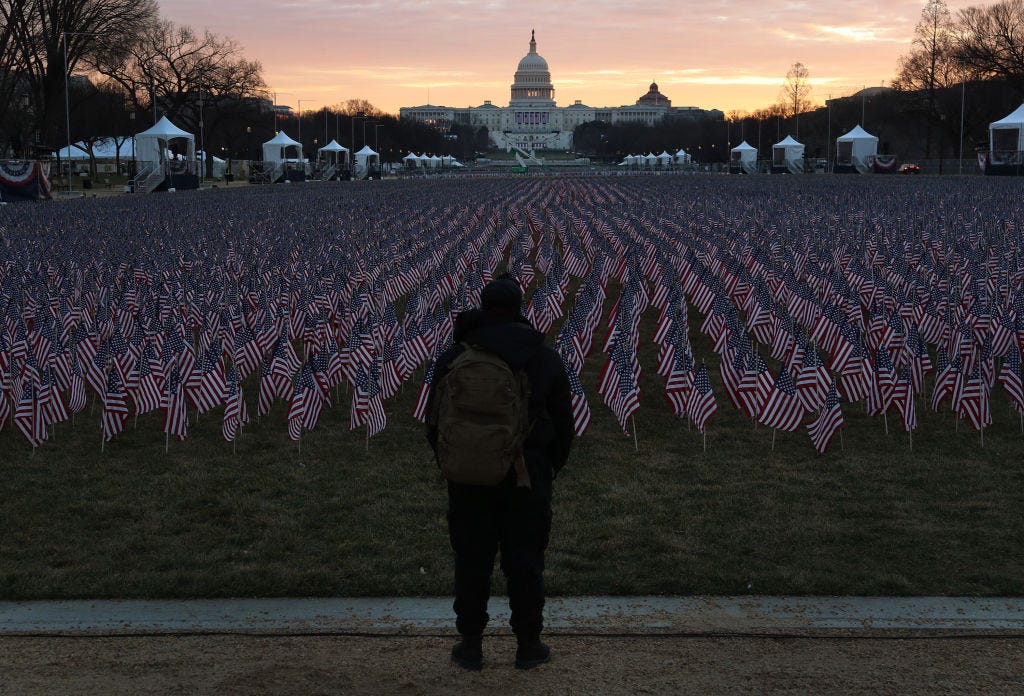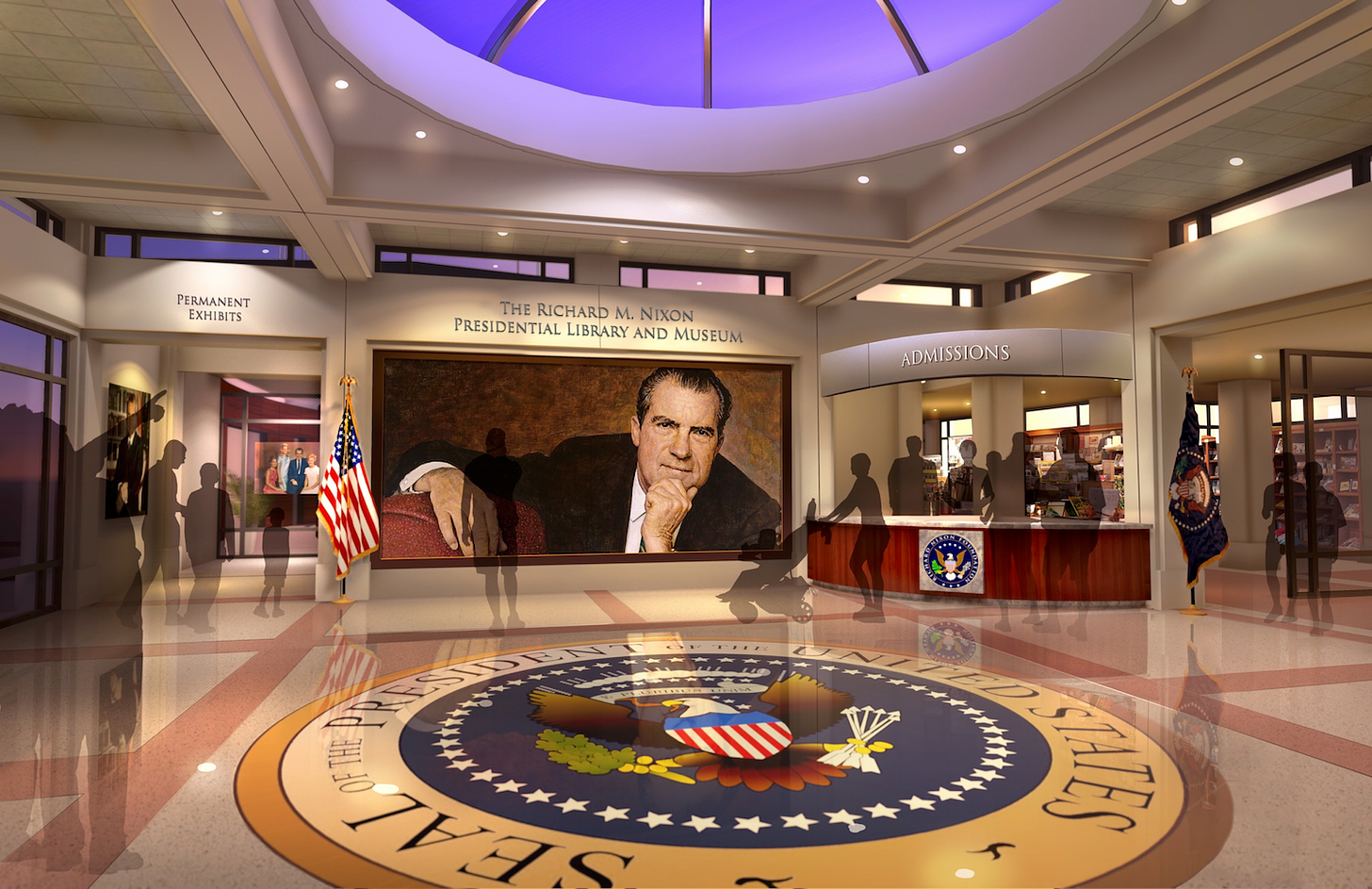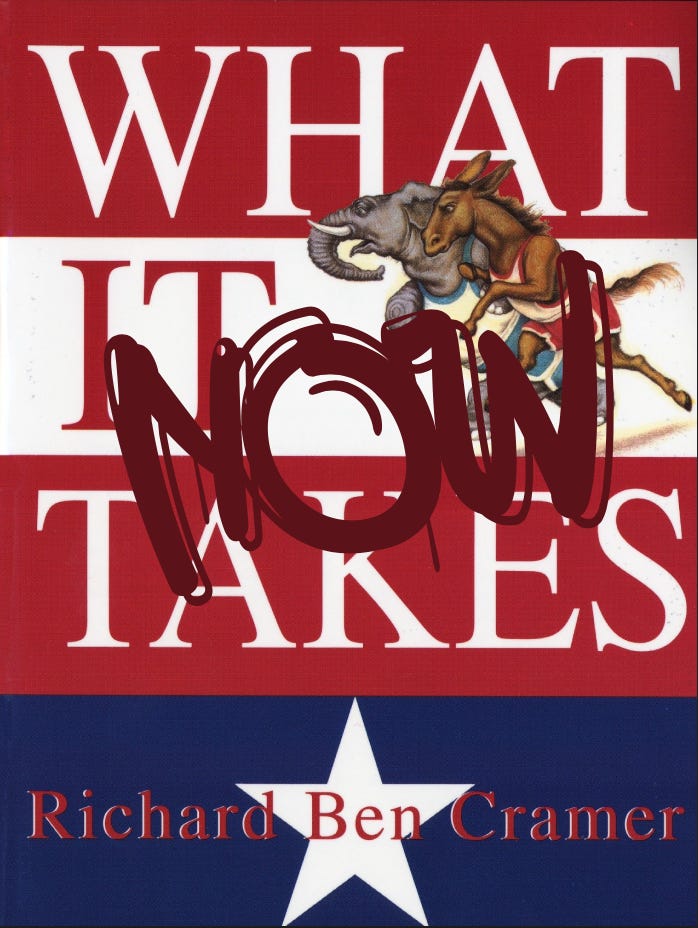Welcome to The Experiment, where we’re spreading the newspapers all over the bed and rolling around in the “muted pageant of utter competency,” as his high holiness Dan Zak put it. This week, we’re making sense of this jarring transition.
We start with you. This week I invited you to contribute to a group effort to document Inauguration Day; bunches of you responded, and the result is a glorious record called “Our Inauguration Day.” I could not be more grateful to all who contributed or proud of the result. Next up is Jack Hughes with “What Would Nixon Do?” which asks whether Donald Trump has what it takes to follow Nixon’s path out of the political wilderness. Jessie Daniels returns to The Experiment with “What It Takes Now,” a re-examination of Richard Ben Cramer’s landmark account of the 1988 presidential campaign. Finally, Dr. Tyrone Grandison says we might be done with the Donald but we still have some reckoning to do in “America’s Lessons.”
And of course, we always remember who we’ve lost and offer recommendations on what to do (making ketchup chicken), read (Adrian Daub’s What Tech Calls Thinking: An Inquiry Into the Intellectual Bedrock of Silicon Valley), watch (One Night in Miami on Amazon Prime), and listen to (“Empire Builder” by Typhoon).
If you’d like to support The Experiment, you can buy merch for 35% off, toss something into the tip jar, and pre-order my book. Or you can just enjoy it, which I dig.
But first, do you ever wonder what the Trump Presidential Library will look like?
We realize that there are more important questions when it comes to Donald Trump’s legacy… Actually, we here at The Experiment admit no such thing. In the ranking of Experiment family outings, visiting a presidential library ranks below a challenging hike and a night at a baseball game and above a movie at the Alamo Drafthouse.
We’ve been taking the kids to presidential libraries for more than a decade. We’ve gabbed with the animatronic LBJ, read JFK’s speeches, gawked at Nixon’s moon landing paraphernalia, marveled at Carter’s modesty and H.W. Bush’s unheralded foreign-policy heroism, and puzzled over why the docent at Woodrow Wilson’s museum seemed intent on telling us that the president enslaved people, but really they were a gift from his in-laws.
Our most meaningful experience came at Clinton’s presidential library in 2010. My oldest son was learning to crawl when the planes hit on 9/11. Almost a decade later, he and I were dawdling through on the second floor in Little Rock when he stopped and stared at the foreign policy exhibit. There were pictures of peace talks, including the Good Friday Accords that ended fighting between Northern Ireland and the United Kingdom and the Dayton Agreement that ended the Bosian War. My son stood and stared. I asked what had caught his attention.
“I didn’t know we could do that,” he said. He didn’t know we could end wars. Our country had been at war his entire life up to that point. He’s a college junior now, and we’re still bogged down in the same war.
“The past is never dead. It's not even past,” as anyone who’s ever seen an abusive relationship in the rearview mirror can tell you. They call it emotional baggage because you take it with you and have to unpack it yourself. It’s going to take us a while to unlearn our reactions to the Trump era, for us not to flinch when Joe Biden raises his hand in greeting. We don’t have to yell now. The noise has been turned down. Also, mom’s new husband isn’t hitting us anymore and calling us weak. If Trump were your step-father, the scale of trauma would make your therapist gasp. We’re gonna need a minute to process January 6, much less the last five years.
A presidential library can serve to help both the president and the populace put history in its proper place. But how do you solve a problem like Donald Trump? How do you snatch a crown and throw it down? How do you find a word that means Melania? A flibbertijibbet! A will-o'-the wisp! A clown!
What in the name of all that is good about America are we going to do for a president who never enjoyed the approval of a majority of the country? What do you put behind glass when the consensus of historians is that Trump finished below the William Henry Harrison Line? How do you do a presidential library for a president who was never presidential and likely never visited a library?
There’s already speculation that the famously accountability-averse president won’t want a repository of papers for historians to pore over. An anonymous architect posted a sarcastic rendering of a Trump presidential library at djtrumplibrary.com that seethes with unfunny, MSNBC-style humor: a Hall of Enablers, an Alt-Right Auditorium, a Grift Shop. (OK, that last one was funny.)
A presidential library is a president’s last, best case to put up, literally, a good front for posterity. This presents a challenge for a president who never once put up a good front and probably thinks posterity is a synonym for butt, and that invites lazy, liberal jokey schtick.
I’m talking lazy, liberal jokes like these: The cafeteria will be a replica of a Pennsylvania diner, but all they’ll serve will be cold fast food. The museum will offer activities like a paper towel toss. Historical exhibits will be in the original Russian. Interactive installations will include cognitive impairment screening tests, sorting the fine people on both sides of the Unite the Right Rally in Charlottesville, and quizzes on whether world leaders are strong or weak. The gift shop will sell Goya Beans and MyPillow products, and the screening room will feature only movies and television shows with Donald Trump, providing endless loops of The Apprentice, Home Alone 2, Wrestlemania, and season 2, episode 8 of Sex in the City.
There was a day recently when the subject of a Trump presidential library came up. This inspired thousands to paraphrase Gore Vidal’s smug joke about the Nixon library burning down. Both books burned, and Trump hadn’t even colored in the second one yet. You can’t imagine a Trump presidential library that isn’t tacky, which rhymes with hacky, and people, if there is a fate worse than death it’s laughing at each other’s jokes not because they’re funny but because their target deserves ridicule.
The iron law of the 2016 Trump campaign was that given all the options, Trump would pick the craziest one. Was their a crazier option than going on live television and asking Russian intelligence to hack into the Clinton campaign’s servers?
There was a different rule for the Trump presidency, of course. It was not that things could always get worse but that they inevitably would.
Now we’re living in a new era that feels as much like Trump’s post-presidency as the Biden administration, and we’d be fools to think that the Trump presidential library would cohere to norms. The inevitable outcome is that there will be a Trump presidential library because there’s a buck to be made. Grift shop? The whole damn thing is going to have a price tag dangling in front of you.
The Trump presidential library will be a memorial for norms, overlaying the dignity of the office over moral emptiness like a new temporary tattoo of the presidential seal on a dead body. The Trump presidential library will be, of course, at Mar-a-Lago, making the Trump International Golf Club the first one to feature moral hazards. Charging admission? Hell, The Trump presidential library is going to sell time shares.
Just as Nixon’s library contains a replica of the East Room so he could hold events and pretend he was still an ex-president in good standing, the grounds outside of Trump’s library will be landscaped to look like the South Lawn to rent out for weddings and political events.
You will enter through the gift shop that will look more like a Trump campaign store with endless racks of brochures for other Trump properties. What you’ll notice most of all will be the noise. He’s giving a speech over a crowd that’s calling for blood, and under it all is a discordantly poppy song.
Gloria, you're always on the run now
Running after somebody, you gotta get him somehow
I think you've got to slow down before you start to blow it
I think you're headed for a breakdown, so be careful not to show it
You see his face on every screen, and his voice and the crowd and that song follow you out of the gift shop and into the museum where the sound of a campaign rally echoes off the tall, white walls. His face — on screens, on framed magazine covers, on front pages — is everywhere.
You really don't remember, was it something that he said?
Are the voices in your head calling, Gloria?
Gloria, don't you think you're fallin'?
If everybody wants you, why isn't anybody callin'?
You’re looking for alcoves, perhaps a quiet hall for reflection over an exhibit of what actually happened, the Supreme Court justices, the impeachments, the… hell, you can’t hear yourself think because of his voice and the crowd and that song. Besides, there’s only one place to go. You’re being funneled toward a door.
You don't have to answer
Leave them hangin' on the line, oh oh oh, calling Gloria
Suddenly, you’re in a room. The noise is still there, but against the plain white walls are funhouse mirrors. You might look into them and see an image ballooning into ridiculous proportions, or you might see your chest inflated into a refraction of musculature. The reflection is never clear, so you adjust. You get used to seeing things not as they are but in ways that you know aren’t true. You notice you still hear his voice, but now he’s reading his tweets, and that’s when the lights go off.
Gloria, I think they got your number
I think they got the alias that you've been living under
What looked like a wall when the lights were on is now an opening to a long hallway. Lights strobe along the tunnel, and you can see his tweets glowing on the walls. The misspelled and invented words and inexplicable capitalization don’t seem as funny this time. The sound of his voice reading the tweets takes up all the air inside the tunnel and then all the space inside your head. Every step in this immersive hell scape is an hour, every pace a day. Every time he tweets it appears on the wall announced by an electronic beep, and the retweets and favorites start to whirr. The replies, a mix of liberal dunking and MAGA rooting, spool out below, circling around and above and below and behind you until you wonder if you will ever escape this digital, cacophonous tomb. You don’t know anymore how long you’ve been here.
But you really don't remember, was it something that they said?
Are the voices in your head calling, Gloria?
It’s too much but it’s all there is, so you shuffle forward, feeling but not seeing the way ahead. Suddenly, the light at the end of a tunnel is an explosion of images of violence. Ludicrous caricatures wave flags in a boat parade that sinks into a lake before running a bus off a highway and beating a police officer to death with a fire extinguisher.
And then it’s over, or at least the assault is. No more of his voice. No more crowd roaring for your blood or laughing at your tears. No one is telling you, “Fuck your feelings.” There’s nothing. Even the song has gone silent. It’s just you in a room with mirrors, except this time you can see things clearly. Your clothes are stuck to your body, and you can feel your heart racing. Every signal your body is sending tells you to run, but you can see with your own eyes that you’re finally safe.
We’re safe, right? It’s going to be OK?
Our Inauguration Day
by a whole lot of us
A lot of us here at The Experiment pitched in to record how we spent the historical day on Wednesday, January 20. We inaugurated a new administration and experience a peaceful transfer of power. The lack of a crowd around the capitol made the inauguration seem like more of a made-for-TV event, and the emotional payload of deactivating the bomb that was the Trump presidency gave it an immediacy many of us were unprepared for. Here is how we experienced the day.
What Would Nixon Do?
by Jack Hughes
In many ways — his penchant for flamboyant lawlessness, his devotion to criminal advisers, his impeachiness — Donald Trump seemed to model his presidency after that of his friend, Richard Nixon. And while Nixon resigned in disgrace, he worked his way back from the political wilderness. Did he blaze a trail for his former protege? The body politic is barely breathing and not sure it can take any more, but Jack Hughes goes there.
What It Takes Now
by Jessie Daniels
New York-based writer Jessie Daniels recently reread Richard Ben Cramer’s classic non-fiction narrative of the 1988 presidential campaign, What It Takes. After four years of Donald Trump and a few days of Joe Biden’s presidency, she understands the title differently and more deeply.
America’s Lessons
by Dr. Tyrone Grandison
Trump’s exit opens the door for a little truth and reconciliation, writes Dr. Tyrone Grandison. The Trump presidency, he argues, was no aberration. “It was as revealing as it was predictable,” he writes. We’ve been here before. Whether we come back here again depends on whether we choose to learn the lessons amply on display for us all to see.
Who we’ve lost
The owner of George’s Happy Hog Bar-B-Q in OKC
This Holocaust survivor
This hero of Chernobyl
How we’re getting through this
Living inside O’Hare
Making ketchup chicken
Taking Dutch dogs for walks
Making beans and garlic toast
Sawing people in half for 100 years
Washing cast iron with soap now, apparently
Banning PowerPoint in business writing (h/t S.C. Gwynne)
Downloading public domain pictures from the British Museum
What I’m reading
Adrian Daub: What Tech Calls Thinking: An Inquiry Into the Intellectual Bedrock of Silicon Valley - Holy hell this is good
It’s not shocking that Rand’s writing would appeal to people whose work is imposed by parents, who fancy themselves individualists but aren’t allowed to drive themselves to school yet.
Ezra Klein: “Biden’s Covid-19 Plan Is Maddeningly Obvious” - /screams in American/
That it is possible for Joe Biden and his team to release a plan this straightforward is the most damning indictment of the Trump administration’s coronavirus response imaginable.
Dan Zak: “What does Josh Hawley think he’s doing?” - If Dan Zak wrote it, we read it.
This is what some people have been afraid of: that Trumpism will not flame out, that it will instead change shape, that it will acquire perfect chestnut hair and blue suits that fit, that it will trade seething mania for intellectual finesse, that it will blather not about strong walls and weak toilets but about cosmopolitan hegemony, that it will not obsess over stolen elections and evil Democrats but instead lodge procedural complaints that sow doubt about the legitimacy of Democratic victories. And so on Jan. 6, Sen. Josh Hawley (R-Mo.) objected to the electoral vote count in the name of The People, about eight hours after The People laid siege to his workplace.
What I’m watching
It can be tough to find the right word, and to string enough of the right words together in a sentence is an accomplishment. To articulate a complete, well-rounded thought is even greater. On NPR’s Pop Culture Happy Hour, Glen Weldon took listeners on a multi-layered story arch comprised of mannered, well-constructed paragraphs in the service of a movie I sure like a lot, One Night in Miami, which imagines Muhammed Ali, Sam Cooke, Jim Brown, and Malcolm X hanging out in a hotel room the night after Ali beat Sonny Liston.
Well, let's just take a step back here and say this is a great idea for a movie. It's a great idea for a play. It's also, especially in terms of plays - it's a familiar one. I mean, I was a theater critic long enough to have seen many, many plays in which you take historical figures. You slap them into one physical space. And you bang them together for, you know, two hours and an intermission. And the reason it works is every time they clash, they characterize themselves. They delineate themselves to each other, to the audience.
When it doesn't work, many times, the playwright has too reverential an attitude toward the historical figure in question, so they don't really clash. They just sit there and speechify. They go over their greatest hits. It's very "Stand And Deliver." When it works, as I think it does here, those clashes are doing work. Those clashes sand down these characters' hard edges more and more each time they clash, and the characters gain nuance and contradiction and grey areas.
Now, let's talk about Kemp Powers. I mean, he said he wrote this play because it's exactly the kind of thing he wanted to see when he was a 16-year-old-kid. He called it the Black "Avengers," like, larger-than-life, iconic figures who are each fighting personal battles, but they are united in a larger battle they're fighting. Now, the director's job when you're adapting a stage play like this is a really daunting one. It is to do nothing less than imbue this action with life, with a cinematic sense of fullness.
And there's a scene that's a flashback about midway through the film - takes place in Boston at a concert, at a Sam Cooke concert, where Malcolm is standing all the way at the back of the concert hall. Sam's on stage. And there's a shot, a tracking shot that starts off at the lip of the stage, staring up at Sam, and backs through the crowd to get to where Malcolm is standing. And as that happens, the sound design changes. So we hear nothing but Sam, and then we just hear the crowd by the time we get to Malcolm. And that's not the kind of thing you can do on stage. …
That shot is doing so much characterizing work of the bond between these two characters, and it underscores what's being said about that relationship in the play at the time, in the movie at the time. So yeah, I just - that's when I knew, OK, we're getting a really rounded, three-dimensional take that's doing a lot of good work.
I loved this movie as much as I love Weldon’s charismatic, erudite criticism. See this movie, sucka.
What I’m listening to
A bunch of my friends and I came up with this Inauguration Day playlist. And here’s my 2020 playlist. “Keep living, don’t die.” You should feel 100% invited to add to these lists.
Typhoon, a Portland-based band, dropped a surprise album called Sympathetic Magic on the world this week. “Empire Builder” is the lead single, a fully formed song about a train trip across a country teetering on an abyss. I am offering to you, yes you, reading this, because if you’ve come this far on the journey with me then we are together, and I want you to know this: “Maybe love is not enough, but let’s not rule out the possibility.”
I know you're feeling
Like you're overmatched
Like the world's against you
Like the deck is stacked
But don't get started
You're smarter than that
You and I know we both know that
Everybody's angry
And everybody's lonely
Maybe it's hopeless and maybe
Love is not enough
But let's not rule out
The possibility
What do you think of today's email? I'd love to hear your thoughts, questions and feedback. I might even put ‘em in the newsletter if I don’t steal it outright.
Enjoying this newsletter? Forward to a friend! They can sign up here. Unless of course you were forwarded this email, in which case you should…
If your new year’s resolution was to lose weight, try Noom, and you’ll quickly learn how to change your behavior and relationship with food. This app has changed my life. Click on the blue box to get 20% off. Seriously, this works.
Headspace is a meditation app. I’ve used it for a couple years and am absolutely shocked at how much it’s taught me about managing my inner life. Try it free for a couple weeks. Don’t worry if you’ve never done it before. They talk you through it.
I now offer personal career coaching sessions through Need Hop.
We set up a merch table in the back where you can get T-shirts, coffee mugs, and even tote bags now. Show the world that you’re part of The Experiment.
We’ve also got a PayPal tip jar, and I promise to waste every cent you give me on having fun, because writing this newsletter for you is some of the most fun I’ve had.
Forget the Alamo: The Rise and Fall of the American Myth by Bryan Burrough, Chris Tomlinson, and myself comes out June 8 from Penguin Random House. There is no better way to support this book than to pre-order a copy. You’re going to love reading what really happened at the Alamo, why the heroic myth was created, and the real story behind the headlines about how we’re all still fighting about it today.









